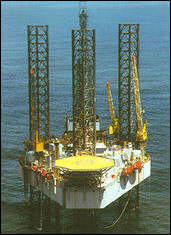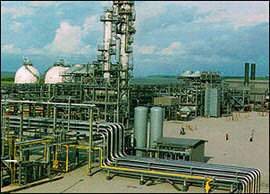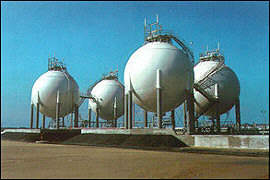 Financial sector Financial sector |
The Federal Government sees the oil & gas sector as one of the major sectors to be restructured. With a reserve of around 30 billion barrels, Nigeria's economic fortunes depend on oil which accounts for around 98 per cent of the country's export of goods.

All aspects of the Nigerian petroleum industry is currently managed by the Nigerian National Petroleum Corporation, NNPC, created in the 1977 as a public corporation. This mandate ranges from exploration for crude oil and natural gas to their production and sale as well as producing oil and gas derivatives for domestic consumption and export. Rising oil prices raised the country's export revenue by over 50% in 1999 despite keeping to OPEC's production ceiling.
Nigeria is widely known for its richness in oil but the country is probably richer in gas.. Gaz was first discovered in Nigeria at Afam in 1956, the same year that the first commercial oil discovery was made in Bayelsa State. Since then, the trend of gas discoveries, mostly in association with oil, has increased to the extent that today Nigeria's known gas reserve is said to be more than twice its crude oil reserves in energy terms. The country has reserves in excess of 120 trillion Standard Cubic feet (TCF) of natural gas encountered during the search for crude oil. Besides, around 180 TCF of undiscovered but recoverable reserves is believed to be available.
The Obasanjo government is therefore pushing for greater investment in gas development. Shell, Mobil and Chevron, the foremost oil operators in Nigeria's oil sector are also spearheading the shift in emphasis to gas. Over two-thirds of the US$ 8.5 billion five-year investment programme in Nigeria which Shell announced in 1999 will go into gas.
Shell is 25% equity holder and manager of Nigeria's Liquefied Natural Gas, LNG, Project. Beginning in October 1999 the gas company has been making shipments to buyers in Europe. Nigerian National Petroleum Corporation, NNPC, the state-owned oil company is a major shareholder in NLNG.

Mr. Jackson Gaius-Obaseki, the group managing director of NNPC believes Nigeria ought to have accelerated its gas development much earlier than now. He says: "There is a realisation that we have wasted these assets. Really gas was in the back bunner but today we know that Nigeria is regarded more as a gas province with some associated oil. So it is only natural that with that realisation, focus should be given to gas which is the fuel of today and the only fuel of the future".
The LNG project's two-train facilities have been completed while work on train three is underway. NNPC says studies on train four and five are on while the marketing of those is on course.
The NLNG will for long remain Nigeria's largest single investment project in oil and gas. The second and third largest producers of Nigeria's oil, Mobil and Chevron also have their individual ambitious gas development projects targeted at the export market. Increased gas commercialisation gives hope of eventual elimination of gas flaring. Gaz flaring is indeed one of the most sensitive issues discussed over the gas sector: around 60 per cent of the produced gas, which is equivalent to 500,000 barrels of oil per day production, is flared essentially because the economy lacks the consumptive capacity to utilise this magnitude of gas. For over three decades, the oil companies chose to flare the gas and pay penalty for doing so rather than harness the gas which is associated with their crude oil production. Being the first gas utilization project of international status in the country, the NLNG project will reduce by 50 per cent gas flaring. The project is also expected to generate about $1 billion revenue on yearly basis for the 22.5-year period estimated for the first two trains.
The NNPC/Chevron Joint Venture completed in May 1997, the first phase of its Escravos Gas Project which captures and processes the natural gas that is produced along with oil. The plant sells gas to the domestic market and exports liquified petroleum gas. The second, which is on progress, will consist in processing additional gas for export.
Mobil has Nigeria's first-ever condensate project which extracts gas liquids from NNPC/Mobil joint venture concessions. The project's two phases have the capacity to process approximately 600 million standard cubic feet of natural gas per day.
The oil companies are also spearheading a West African gas pipeline project that will serve some countries in the West African sub-region. | Obaseki explains this: "Foreign investors that came to prospect at the time knew that oil certainly was more easily tradeable and that you needed established markets for gas as well as capital for infrastructure to develop gas. Now with the LNG steadily expanding its output capacity, intense marketing becomes crucial".

Nigeria's gas export is not targeted at a single region, says Obaseki. "What we feel is that we have a responsibility to contribute to the world energy demand".
Special adviser to President Obasanjo on petroleum and energy, Dr. Alhaji Rilwanu Lukman says Nigeria's entry into the world LNG league sets the country on the road to diversification of its economy. When train three is completed, Nigeria will account for 8% of world LNG market. The promotion of gas utilisation has been on-going but has been very slow.
"Indeed, it can be rightly said that LNG production is coming twenty-five years late", Dr. Lukman observes. The Central bank of Nigeria expects significant investment inflow into the emerging attractive gas sector.
It is the NNPC joint venture partners (Shell, Chevron, Agip, Elf, Mobil & Texaco) that have been responsible for the bulk of Nigeria's crude oil production and gas harnessing. Fiscal incentives introduced since 1998 have encouraged their increased activity in the gas sector. Similar fiscal incentives contained in a memorandum of understanding (MOU) have also encouraged investment in oil exploration and production activities. In the various joint venture arrangements, the NNPC holds on average 60% interest while the major oil company partner manages the operation.
NNPC continues to undergo strategic restructuring which under the present administration should culminate in the privatisation of some of its subsidiaries especially in the downstream operations of refineries and petrochemicals. Department of Petroleum Resources (DPR) is the regulator of the oil and gas sector while NNPC is a key operator. A further restructuring should see the NNPC being more of a holding company. NNPC seeks to strengthen its local and foreign asset base by launching offshore investments in Europe and the USA in order to become a truly international oil and gas company. The government hopes that full deregulation of downstream operations would see private investors coming in to set up refineries. The refineries owned by the NNPC have been slated for privatisation after refurbishment. The ground rules for private ownership of refineries have existed for over ten years now but investors were not persuaded enough given the attitude of past governments.
The pro-active orientation of the Obasanjo administration gives ground for hopes that within the next three to five years, privately - owned refineries will spring up targeted at both domestic and foreign markets. A refinery is envisaged within Nigeria's Export Processing Zone, EPZ.
Still the bulk of foreign investment in the energy sector will go to upstream operations and gas development. While the oil majors are executing ambitious programmes some independents have found it attractive to enter the sector mainly through partnership with indigenous companies that have been awarded oil blocks. A number of the oil licenses awarded by past governments were cancelled by the Obasanjo government citing flawed procedures. On March 1, 2000, the Federal Government announced the availability of concessions for the year 2000 Licensing Round. 22 onshore and offshore blocks in the Niger Delta have been placed on tender for open and competitive bidding by all interested parties including the majors and the independents, both foreign and indigenous.
The deep off shore is becoming the main theatre of operation for Nigeria's oil exploration and production activities. It is where the bulk of current reserves are. Located in about 2,000 to 3,000 metres of water depth, the new wells are part of the Federal Government's plan to use such blocks rich in crude oil, to boost the nation's reserve. The Government hopes that the expected discoveries in this region, will help increase Nigeria's reserve from the current 30 billion barrels to 50 billion barrels in the next decade. The movement off shore should reduce the relationship problems between the oil companies and the Niger Delta oil producing communities. Much of the deep off-shore activities will not be under the joint venture arrangements which have proved problematic in the past. The bane of the joint ventures has been government's regular inability to meet its capital contribution obligations.
Although the present government has been meeting its current cash call commitments, accumulated arrears still remain.
Besides joint venture arrangements, oil majors are increasingly going for production sharing contracts (PSC). Under this arrangement, the oil company bears the entire cost of exploration and production. The cost and an agreed proportion of profit will be recouped from the output produced.
Shell and some private partners are funding the entire cost of developing a new deep off-shore block without involving the government. Independents and the majors are active in the deep off-shore through production sharing contracts. Obasanjo has indicated that he will review fiscal measures regarding the oil sector.
Government will still be dominant in Nigeria's oil sector for quite some time to come but the private sector seems set to play a more active role. |

